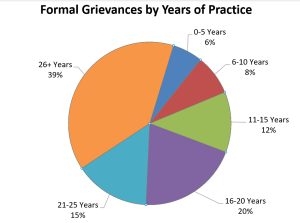Oklahoma Bar Journal
The Graying of the Legal Profession and Its Effect on Disciplinary Models
By Gina Hendryx
 In 2007, a joint committee comprised of members from the National Organization of Bar Counsel (NOBC) and the Association of Professional Responsibility Lawyers (APRL) published a report on issues facing aging lawyers and the effectiveness of traditional attorney discipline models when applied to senior lawyers. The primary focus of the study, as well as that of most attorney regulatory offices, was the protection of the public while respecting the integrity and dignity of our aging attorney populations.
In 2007, a joint committee comprised of members from the National Organization of Bar Counsel (NOBC) and the Association of Professional Responsibility Lawyers (APRL) published a report on issues facing aging lawyers and the effectiveness of traditional attorney discipline models when applied to senior lawyers. The primary focus of the study, as well as that of most attorney regulatory offices, was the protection of the public while respecting the integrity and dignity of our aging attorney populations.
According to the United States Census Bureau, more than 56 million adults aged 65 and older live in the United States and account for about 16.5% of this nation’s population. This figure is expected to reach 22% by 2050 and represents a significant increase from 1950, when the population of people aged 65 and over was only 8%. This “senior tsunami” or “baby boomer” generation is mirrored in our own bar association statistics. At the end of 2022, membership in the Oklahoma Bar Association was 18,588. Oklahoma attorneys over the age of 60 accounted for 42% of that total, and if you include attorneys over the age of 50, the total increases to 60%. We have more attorneys over the age of 70 practicing law in Oklahoma than we have under the age of 30.
Lawyers are continuing to practice beyond the traditional retirement age of 65. The NOBC/APRL report attributed this aging workforce to “1) the steady increase in the past fifty years in the number of lawyers admitted to practice each year; 2) the demographic shift in the elderly population; 3) dramatic improvements in health care which have extended professional work lives; 4) the strong desire among many senior lawyers to continue making positive contributions to society; and 5) economic necessity, which will compel lawyers to continue working because their pensions or savings are insufficient to support themselves and their families.”[1]
All these factors are readily identifiable when reviewing and investigating grievances submitted against senior lawyers. The vast majority of Oklahoma’s senior lawyer community provides good, competent legal representation to their clients. These lawyers also serve as indispensable mentors to younger lawyers and provide much-needed pro bono representation to underserved populations. However, 40% of the formal grievances submitted in 2022 were against lawyers who have been in practice for more than 26 years. Lawyers over the age of 50 accounted for 67% of these complaints, while those over the age of 60 accounted for 35% of the complaints.[2]
Of the lawyers receiving formal discipline from the Oklahoma Supreme Court in 2022, 73% were over the age of 50, and 42% were over the age of 60. These numbers and percentages are consistent with previous years’ reports. The reports reflect a graying lawyer population, wherein the majority of grievances are lodged against our older members. This statistical certainty could be merely one of demographics. Most of our population “fits” into the age and years of practice group that historically receives the most complaints. However, a deeper look into the allegations lodged against these lawyers confirms that age-related impairments are impacting the quality of legal work and pose a risk of harm to clients and/or the public. These allegations include neglect of clients and their legal matters, decreased competency in the representation of clients and knowledge of the law, alcohol and substance abuse and mental illness. These lawyers are often in denial about any age-related issues affecting their legal skills and are resistant to discussing the same with others.
Lawyers, judges, and family members are usually the first to notice when a colleague or contemporary is experiencing age-related impairment issues. Most are uncomfortable with confronting the lawyer with these concerns or reporting the same to the Oklahoma Bar Association. However, with early intervention, outcomes are usually better for both the lawyer and their clients. Options that serve to protect the public while maintaining the dignity of the senior lawyer include:

AnnaStills | #401674478 | stock.adobe.com
- Retired membership status. Upon reaching the age of 70, an active member in good standing of the OBA may elect to be designated as a “retired member.” A retired member may not be engaged in the practice of law and is no longer required to pay annual membership dues. By electing to take “retired” status, the senior lawyer remains a member of the OBA but agrees to no longer practice law.
- Associate membership status. An OBA member of any age may request associate membership status based upon illness, infirmity or other disability. Associate members are unable to practice law for the duration of their illness and must make an appropriate showing to be reclassified as active members. During the term of the associate status, the lawyer may not be engaged in the practice of law and is not required to pay annual membership dues.
- Suspension for personal incapacity to practice law. The Rules Governing Disciplinary Procedures sets forth the procedures for the suspension of a lawyer’s license due to being personally incapable of practicing law due to a mental or physical illness.[3] Proceedings to determine whether a lawyer is incapable of practicing law are instituted by the OBA Office of the General Counsel and conducted in the same manner as disciplinary proceedings and are strictly confidential. Usually, the lawyer is subject to a mental health evaluation by qualified medical personnel. The lawyer may consent to the suspension or contest the same in a formal hearing. If it is determined that the lawyer is incapable of practicing law, their license shall be suspended until reinstated by the Oklahoma Supreme Court.
The goal when assessing a senior lawyer’s ability to continue to practice law should always be to preserve the lawyer’s dignity while protecting the public and preserving the public’s confidence in the legal system. Identification and early intervention are the keys to achieving these outcomes. Retired and associate membership categories afford senior lawyers a more palatable option to resign and often can avoid the need for disciplinary intervention.
ABOUT THE AUTHOR
Gina Hendryx serves as OBA general counsel.
ENDNOTES
[1] “NOBC-APRL Joint Committee on Aging Lawyers Final Report,” May 2007.
[2] The OBA Office of the General Counsel received 198 formal grievances involving 151 attorneys in 2022. A formal grievance is one that, based upon the allegations, is designated for assignment to an attorney and investigator for formal review.
[3] Rule 10, Rules Governing Disciplinary Proceedings, 5 O.S. 2021, Ch.1, App. 1-A.
Originally published in the Oklahoma Bar Journal – OBJ 94 Vol 4 (April 2023)
Statements or opinions expressed in the Oklahoma Bar Journal are those of the authors and do not necessarily reflect those of the Oklahoma Bar Association, its officers, Board of Governors, Board of Editors or staff.
